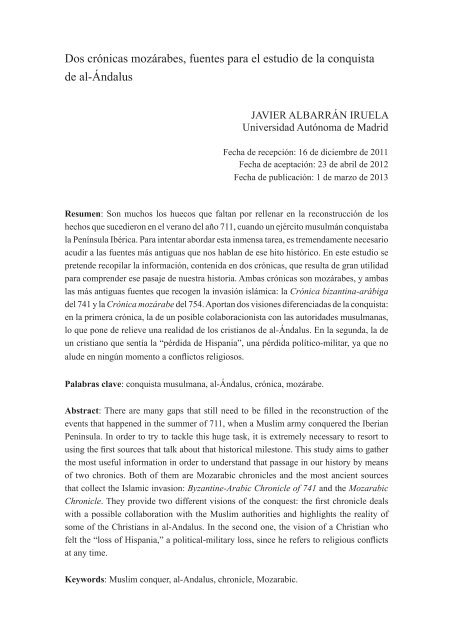Segundo%20nu%CC%81mero%20de%20la%20Revista%20Historia%20Auto%CC%81noma
Segundo%20nu%CC%81mero%20de%20la%20Revista%20Historia%20Auto%CC%81noma
Segundo%20nu%CC%81mero%20de%20la%20Revista%20Historia%20Auto%CC%81noma
You also want an ePaper? Increase the reach of your titles
YUMPU automatically turns print PDFs into web optimized ePapers that Google loves.
Dos crónicas mozárabes, fuentes para el estudio de la conquista<br />
de al-Ándalus<br />
JAVIER ALBARRÁN IRUELA<br />
Universidad Autónoma de Madrid<br />
Fecha de recepción: 16 de diciembre de 2011<br />
Fecha de aceptación: 23 de abril de 2012<br />
Fecha de publicación: 1 de marzo de 2013<br />
Resumen: Son muchos los huecos que faltan por rellenar en la reconstrucción de los<br />
hechos que sucedieron en el verano del año 711, cuando un ejército musulmán conquistaba<br />
la Península Ibérica. Para intentar abordar esta inmensa tarea, es tremendamente necesario<br />
acudir a las fuentes más antiguas que nos hablan de ese hito histórico. En este estudio se<br />
pretende recopilar la información, contenida en dos crónicas, que resulta de gran utilidad<br />
para comprender ese pasaje de nuestra historia. Ambas crónicas son mozárabes, y ambas<br />
las más antiguas fuentes que recogen la invasión islámica: la Crónica bizantina-arábiga<br />
del 741 y la Crónica mozárabe del 754. Aportan dos visiones diferenciadas de la conquista:<br />
en la primera crónica, la de un posible colaboracionista con las autoridades musulmanas,<br />
lo que pone de relieve una realidad de los cristianos de al-Ándalus. En la segunda, la de<br />
un cristiano que sentía la “pérdida de Hispania”, una pérdida político-militar, ya que no<br />
alude en ningún momento a conflictos religiosos.<br />
Palabras clave: conquista musulmana, al-Ándalus, crónica, mozárabe.<br />
Abstract: There are many gaps that still need to be filled in the reconstruction of the<br />
events that happened in the summer of 711, when a Muslim army conquered the Iberian<br />
Peninsula. In order to try to tackle this huge task, it is extremely necessary to resort to<br />
using the first sources that talk about that historical milestone. This study aims to gather<br />
the most useful information in order to understand that passage in our history by means<br />
of two chronics. Both of them are Mozarabic chronicles and the most ancient sources<br />
that collect the Islamic invasion: Byzantine-Arabic Chronicle of 741 and the Mozarabic<br />
Chronicle. They provide two different visions of the conquest: the first chronicle deals<br />
with a possible collaboration with the Muslim authorities and highlights the reality of<br />
some of the Christians in al-Andalus. In the second one, the vision of a Christian who<br />
felt the “loss of Hispania,” a political-military loss, since he refers to religious conflicts<br />
at any time.<br />
Keywords: Muslim conquer, al-Andalus, chronicle, Mozarabic.


